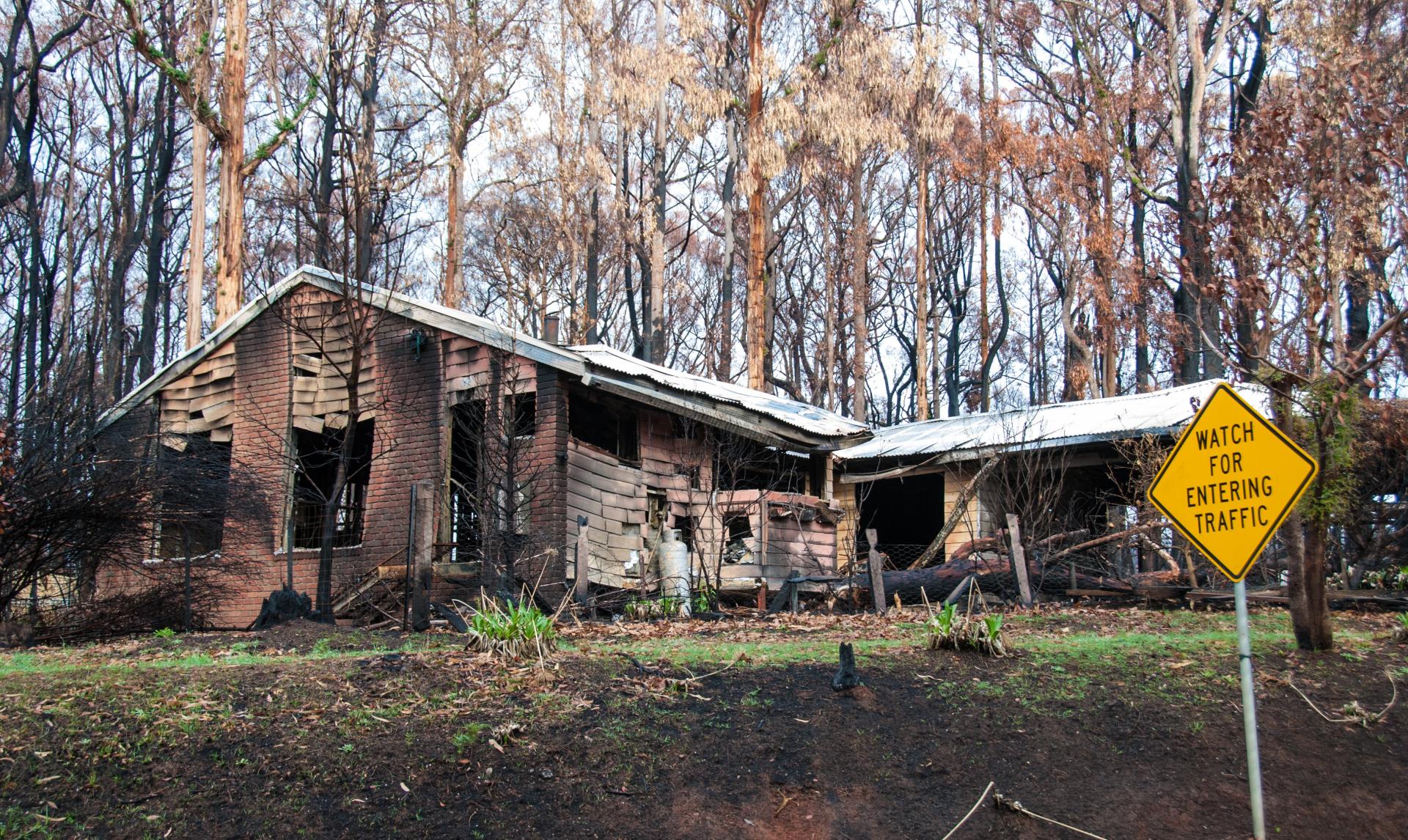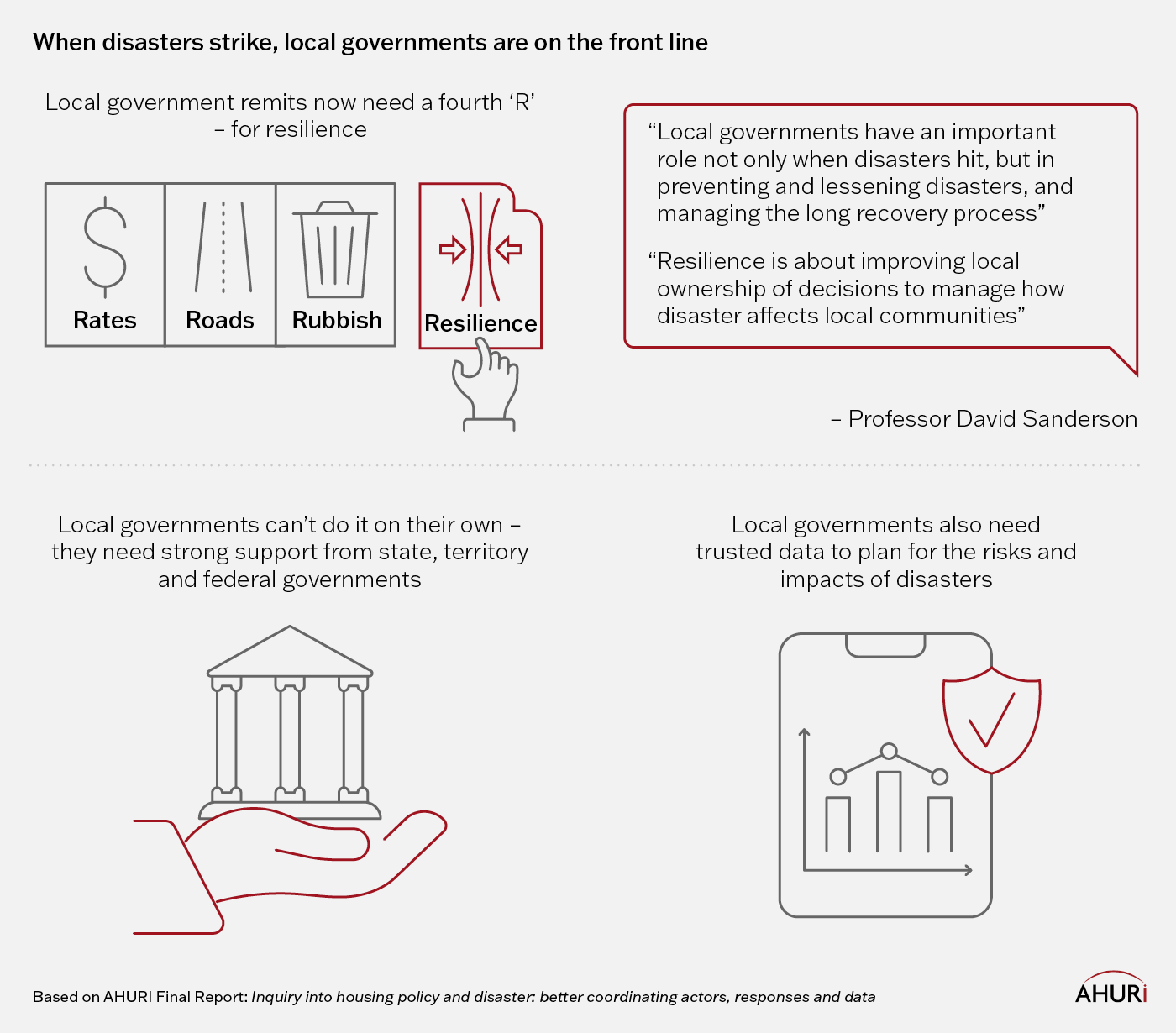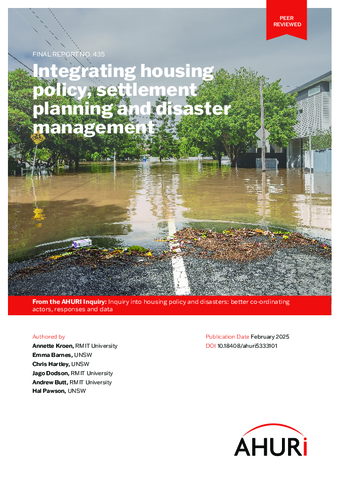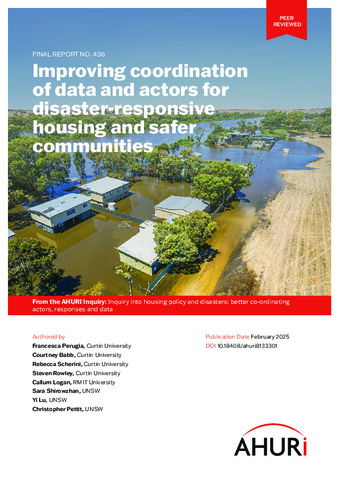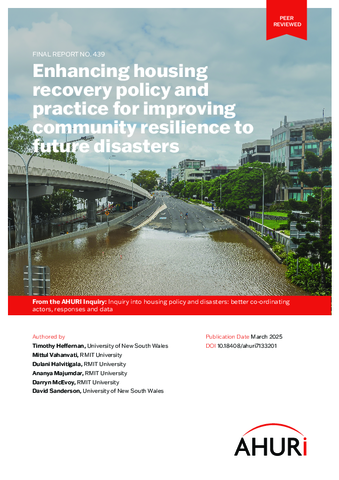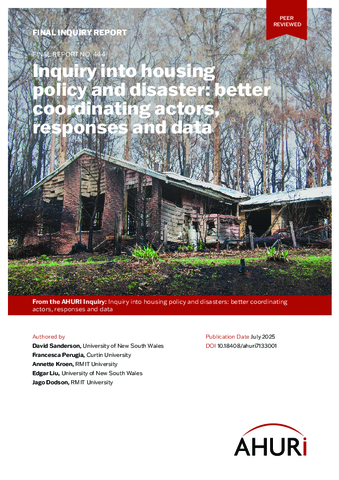Final AHURI Inquiry report
What this research is about
This research Inquiry looked at:
- improving how government groups work together to strengthen housing policy and planning for disasters
- the housing disaster recovery approaches that best help prevent future disaster
- improving how agencies use data in housing supply processes to support disaster-ready housing and communities.
This research report is the final report of the AHURI Inquiry, Housing policy and disasters: better coordinating actors, responses and data.
Why this research is important
Climate-related disasters are set to increase. Governments at all levels need to better coordinate housing policies and practices to reduce the impact of disasters on households.
-
At a glance
-
Key findings
The inquiry found:
- state and territory emergency and reconstruction agencies need better links with housing and planning agencies
- planning policies over the last ten years have built in disaster risk responses for bushfires. However, risk reduction for other threats like floods and cyclones is less regulated
- disaster risk reduction could be improved by housing strategies that consider climate change impacts and disaster risks. Settlement planning decisions need better coordination with disaster-related groups' policies and practices.
It also found:
Barriers to incorporating disaster risk management
There are barriers to integrating housing policy, settlement planning and disaster management:
- different work cultures and goals between agencies can lead to different risk assessments
- differences in assessing risks, partly caused by lack of understanding of the risk by agencies that do not work in this area often
- agencies are limited from working together closely by frequent restructuring of organisations and the use of staff on fixed-term contracts.
Local Government has an important role, but is hampered
Local government is best placed to support communities in preparing and implementing prevention and mitigation strategies, as well as support after disasters strike. However, this role is limited by a lack of resources, lack of investment and lack of a political authority.
Use of data is essential to reduce disaster risk
Data plays a crucial role in making good decisions for reducing and managing risks from disaster events. However, there is a lack of data standards, availability and quality leading to a lack of trust in the use of data.
Planning systems are not taking disasters or data fully into account
Planning frameworks and policies for decision-making—such as zoning, standards and building codes—are not strong enough to address risk well enough.
When disaster management policies need updating it often becomes a long and complex process. Policy reviews and updates often start as reactions to disaster events, rather than responding to better data.
-
Policy actions
Policy outcomes can be improved by:
- making disasters a planning priority. Consider natural hazards and disaster risk reduction in housing strategies—including the location and quality of housing
- adding a fourth 'R' for 'resilience’ (in addition to ‘rates, roads and rubbish’) for essential local government duties and improving local ownership of decisions that affect communities. Make sure local governments have a clear role in local disaster mitigation and recovery
- improving information sharing between housing, planning and disaster management agencies
- simpler planning processes and risk assessments after disasters, such as flexible planning rules for temporary housing and rebuilding
- ensuring evaluation of recovery programs and experiences for housing and planning
- clarifying the responsibilities of different tiers of government.
Disaster responses can be improved by:
- broadening after-disaster housing solutions. Focus on meeting immediate needs while also supporting longer-term household and economic recovery at every opportunity
- developing managed retreat and buyback policies (where housing in risky areas is bought by government and removed) and programs. These policies need to be transparent, fair and effective to avoid harming communities
- treating temporary housing villages as a last resort. If they are used, there must be a plan for reusing them after recovery that benefits the community
- ensuring ‘build back better’ principles in after-disaster rebuilding
- investigating alternative strategies for home insurance policies in higher risk areas
The use of data can be improved by:
- putting the trust back into data. Better data-driven decision-making requires addressing limits in data sharing through stronger data-governance systems
- strengthening the digital technology skills of government groups and professional bodies to effectively support data exchange and analysis for decision-making
- improving the standardisation of data
- creating risk assessment tools and data-recording systems that can track and manage changes in risk effectively. This needs to be paired with legal requirements that define how and when the risk is shared through ‘mandatory risk disclosure’
- recognising that increasing numbers of people do not have housing disaster insurance. Better data is needed, along with more government engagement and support for mitigation and prevention measures
- simplifying complex urban planning processes, governance structures and policies to be data responsive to better assess, manage and reduce disaster risk.
-
Research design
This research reviewed academic and grey literature; the institutional and policy environments for housing policy, settlement planning and disaster preparedness and response; interviewed key informants; surveyed community members, government and private industry representatives; and reviewed seven post-disaster recovery events across four states in Australia.

